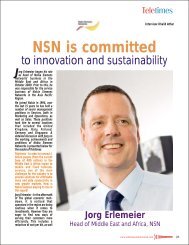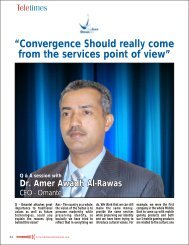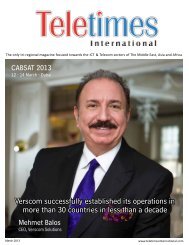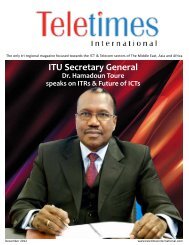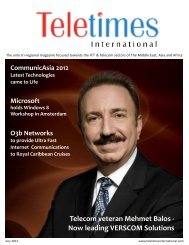Teletimes April 2011.pdf
Teletimes April 2011.pdf
Teletimes April 2011.pdf
Create successful ePaper yourself
Turn your PDF publications into a flip-book with our unique Google optimized e-Paper software.
SAMENA’s Broadband Summit<br />
key note address<br />
Dr. Mohammad Ali Al-Wahaibi, Unders secretary for<br />
Communications, Government of Oman<br />
would like to welcome all<br />
I the participants and guests<br />
to Muscat for the SAMENA<br />
Broadband Summit 2011. We<br />
are very privileged to host<br />
this important Summit that<br />
gathers Industry Experts on<br />
Broadband.<br />
As you are aware, Broadband<br />
networks are increasingly<br />
recognized as fundamental<br />
prerequisite for economic<br />
and social development. They<br />
serve as a communication<br />
and transaction platform for<br />
the entire economy and can<br />
improve productivity across all<br />
sectors.<br />
it is, therefore, a key driver<br />
of economic growth and<br />
national competitiveness, and<br />
it can contribute to social and<br />
cultural development.<br />
For many countries building<br />
Next Generation Broadband<br />
Networks constitute the<br />
single largest Infrastructure<br />
investment. Countries that<br />
don’t join the race risk the<br />
chance of being left behind<br />
in future economic and social<br />
prosperity.<br />
However, due to the size<br />
and scale of the Investment<br />
of building next-generation<br />
broadband networks, telecom<br />
companies face a dilemma;<br />
first the level of uncertainty<br />
that relates to direct profitable<br />
return is not straightforward,<br />
second the new network<br />
remains a field of competition,<br />
third the regulation is not<br />
clear, and fourth the demand is<br />
uncertain.<br />
Thus, due to the national<br />
economic benefits of NBN,<br />
government intervention is<br />
required to expedite its rollout.<br />
However, before a<br />
government embarks<br />
in Building the<br />
Next- Generation<br />
Broadband Network<br />
it should balance<br />
between many<br />
conflicting<br />
requirements.<br />
The First issue<br />
is the type of<br />
Government<br />
Intervention:<br />
Should the<br />
government<br />
play the role of<br />
an Observer, a<br />
Facilitator, or a Driver?<br />
However, before a<br />
government decides on the<br />
type of intervention it should<br />
review the country specific<br />
characteristics such as market<br />
structure, economic indicators,<br />
and geographic spread of the<br />
population.<br />
The Second issue relates to<br />
Demand:<br />
Is there an actual demand for<br />
Next generation Broadband? Is<br />
this demand certain?<br />
Can we build the NBN and<br />
assume that customers will<br />
queue for it? A sort of “build it<br />
and they will come!”<br />
What levers that government<br />
can apply to stimulate Demand<br />
for NBN?<br />
The third issue relates to<br />
Regulation:<br />
What is the best Regulatory<br />
Regime for NBN? What<br />
costing methodologies should<br />
be adopted? What about<br />
frequency allocation?<br />
Are<br />
the old<br />
regulatory<br />
tools such as local loop and<br />
interconnect regimes STILL<br />
suitable for the NBN.<br />
Should a Regulator protect the<br />
investment of operators on<br />
the first-generation BB? And<br />
how would the Regulator chart<br />
a successful transition to the<br />
NBN regime.<br />
The Fourth Issue is<br />
Competition:<br />
Can the existing level of<br />
competition be achieved? Or<br />
would the new NBN reduce<br />
competition?<br />
Would the new competition be<br />
in services and applications?<br />
If the new competition is in<br />
Services, would the new regime<br />
dis-incentives operators from<br />
Investing in Infrastructure? Do<br />
operators need to review their<br />
layers of traditional service<br />
delivery?<br />
The fifth issue relates to<br />
Technology:<br />
Does the new NBN have to<br />
be based on fiber only?<br />
Can mobile play a role as<br />
well? What technology<br />
should be used at the<br />
access level to foster<br />
innovation?<br />
And finally what is the<br />
social impact of the<br />
NBN? Would the new<br />
NBN Bridge the digital<br />
divide between rural<br />
areas and the cities?<br />
What government policy<br />
is needed to stimulate<br />
delivery of intended benefits<br />
to the underserved?<br />
Your excellencies, ladies and<br />
gentlemen,,,,<br />
I have provided more questions<br />
than answers for the purpose<br />
of stimulating debate on the<br />
issues surrounding NBN rollout<br />
on this Summit. Furthermore<br />
I strongly believe that there is<br />
no perfect answer or a perfect<br />
recipe for rollout of NBN that<br />
a country can copy and apply<br />
successfully. The debate around<br />
NBN rollout is ongoing around<br />
the world, and while there<br />
are many success stories from<br />
government5 around the world,<br />
a country should find its own<br />
formula based on its market<br />
structure, social settings,<br />
economic indicators, and the<br />
intensity and the geographic<br />
spread of its population.<br />
Keeping that in mind, I am<br />
pleased to announce that<br />
Oman has embarked on its<br />
own discovery exercise for the<br />
objective of finding the best<br />
formula of leapfrogging in<br />
the race of Next-Generation<br />
National Broadband Network. T<br />
28 www.teletimesinternational.com<br />
15Apr - 14May 2011




